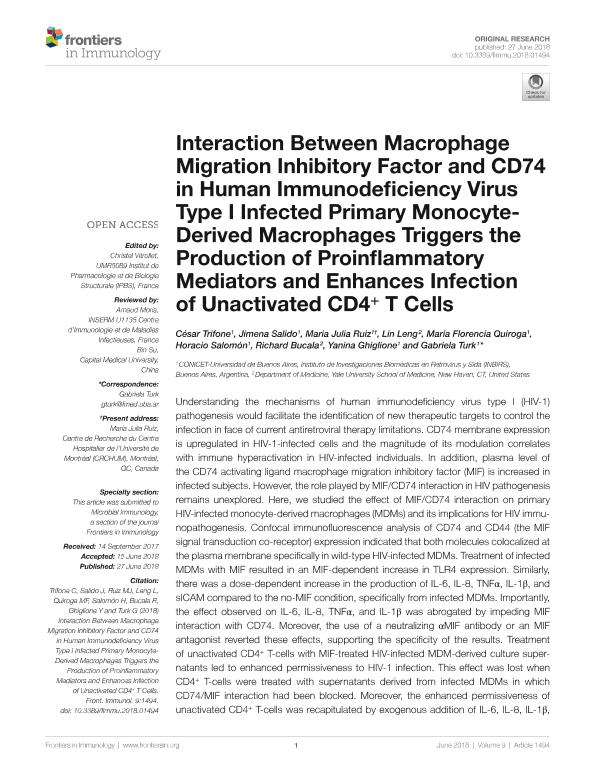Artículo
Interaction between macrophage migration inhibitory factor and CD74 in human immunodeficiency virus type I infected primary monocyte-derived macrophages triggers the production of proinflammatory mediators and enhances infection of unactivated CD4+ T cells
Trifone, César Ariel ; Salido, Jimena Patricia
; Salido, Jimena Patricia ; Ruiz, María Julia
; Ruiz, María Julia ; Leng, Lin; Quiroga, María Florencia
; Leng, Lin; Quiroga, María Florencia ; Salomon, Horacio Eduardo
; Salomon, Horacio Eduardo ; Bucala, Richard; Ghiglione, Yanina Alexandra
; Bucala, Richard; Ghiglione, Yanina Alexandra ; Turk, Gabriela Julia Ana
; Turk, Gabriela Julia Ana
 ; Salido, Jimena Patricia
; Salido, Jimena Patricia ; Ruiz, María Julia
; Ruiz, María Julia ; Leng, Lin; Quiroga, María Florencia
; Leng, Lin; Quiroga, María Florencia ; Salomon, Horacio Eduardo
; Salomon, Horacio Eduardo ; Bucala, Richard; Ghiglione, Yanina Alexandra
; Bucala, Richard; Ghiglione, Yanina Alexandra ; Turk, Gabriela Julia Ana
; Turk, Gabriela Julia Ana
Fecha de publicación:
27/06/2018
Editorial:
Frontiers Research Foundation
Revista:
Frontiers in Immunology
ISSN:
1664-3224
Idioma:
Inglés
Tipo de recurso:
Artículo publicado
Clasificación temática:
Resumen
Understanding the mechanisms of human immunodeficiency virus type I (HIV-1) pathogenesis would facilitate the identification of new therapeutic targets to control the infection in face of current antiretroviral therapy limitations. CD74 membrane expression is upregulated in HIV-1-infected cells and the magnitude of its modulation correlates with immune hyperactivation in HIV-infected individuals. In addition, plasma level of the CD74 activating ligand macrophage migration inhibitory factor (MIF) is increased in infected subjects. However, the role played by MIF/CD74 interaction in HIV pathogenesis remains unexplored. Here, we studied the effect of MIF/CD74 interaction on primary HIV-infected monocyte-derived macrophages (MDMs) and its implications for HIV immunopathogenesis. Confocal immunofluorescence analysis of CD74 and CD44 (the MIF signal transduction co-receptor) expression indicated that both molecules colocalized at the plasma membrane specifically in wild-type HIV-infected MDMs. Treatment of infected MDMs with MIF resulted in an MIF-dependent increase in TLR4 expression. Similarly, there was a dose-dependent increase in the production of IL-6, IL-8, TNFα, IL-1β, and sICAM compared to the no-MIF condition, specifically from infected MDMs. Importantly, the effect observed on IL-6, IL-8, TNFα, and IL-1β was abrogated by impeding MIF interaction with CD74. Moreover, the use of a neutralizing αMIF antibody or an MIF antagonist reverted these effects, supporting the specificity of the results. Treatment of unactivated CD4+ T-cells with MIF-treated HIV-infected MDM-derived culture supernatants led to enhanced permissiveness to HIV-1 infection. This effect was lost when CD4+ T-cells were treated with supernatants derived from infected MDMs in which CD74/MIF interaction had been blocked. Moreover, the enhanced permissiveness of unactivated CD4+ T-cells was recapitulated by exogenous addition of IL-6, IL-8, IL-1β, and TNFα, or abrogated by neutralizing its biological activity using specific antibodies. Results obtained with BAL and NL4-3 HIV laboratory strains were reproduced using transmitted/founder primary isolates. This evidence indicated that MIF/CD74 interaction resulted in a higher production of proinflammatory cytokines from HIV-infected MDMs. This caused the generation of an inflammatory microenvironment which predisposed unactivated CD4+ T-cells to HIV-1 infection, which might contribute to viral spreading and reservoir seeding. Overall, these results support a novel role of the MIF/CD74 axis in HIV pathogenesis that deserves further investigation.
Archivos asociados
Licencia
Identificadores
Colecciones
Articulos(INBIRS)
Articulos de INSTITUTO DE INVESTIGACIONES BIOMEDICAS EN RETROVIRUS Y SIDA
Articulos de INSTITUTO DE INVESTIGACIONES BIOMEDICAS EN RETROVIRUS Y SIDA
Citación
Trifone, César Ariel; Salido, Jimena Patricia; Ruiz, María Julia; Leng, Lin; Quiroga, María Florencia; et al.; Interaction between macrophage migration inhibitory factor and CD74 in human immunodeficiency virus type I infected primary monocyte-derived macrophages triggers the production of proinflammatory mediators and enhances infection of unactivated CD4+ T cells; Frontiers Research Foundation; Frontiers in Immunology; 9; 1494; 27-6-2018; 1-20
Compartir
Altmétricas



